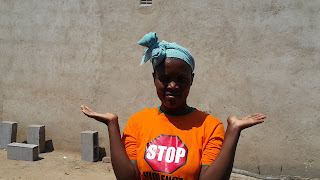On the weekend of 15 – 17 March 2019, both Chimanimani and Chipinge districts suffered multiple destruction from Cyclone Idai with survivors needing shelter, water, food, medication and blankets. There was massive death and destruction of property and infrastructure in the two districts. However, on 20 April 2019, Platform for Youth Development (PYD) held a community prayer meeting at Checheche growth point in remembrance of Cyclone Idai victims. The prayer meeting was focused on restoring and maintaining hope in the affected communities, at the same time allay the development of post-traumatic stress disorder (PTSD) symptoms.
“We carry strong sentiments and beliefs about our relatives and friends who fell victims to the devastating Cyclone Idai, and as the Ndau people we were raised to love, serve, and honour our fellow people no matter what the situation. Cyclone Idai destroyed families, individual lives as well as our community fabric.” Claris Madhuku told the gathering.
“The clean-up campaign and the prayer meeting is a symbol of hope as we recover from the Cyclone Idai disaster. As a Christian clergy, we are to play an important role in identifying individuals with challenges in facing with the reality of the Cyclone Idai disaster and we are prepared to offer support to the victims.” Added Rev Joseph Mugidheya of the United Church of Christ in Zimbabwe (UCCZ).
The prayer meeting was a collaboration between PYD and religious leaders in Chipinge district as a collective effort to provide both material and emotional/spiritual support to Cyclone Idai victims. PYD strongly believed that the community prayer meeting was a strategy for reducing the victim of Cyclone Idai’s trauma. Survivors of a devastating phenomenon of the stature of the Cyclone Idai usually feel guilty about loved ones who lost their lives and property lost. Thus, a community prayer meeting helped by reducing survivors’ guilt and increasing their hope for future life. In PTSD, the acceptance of a spiritual power normally leads to a spiritual awakening which, in turn, can assuage survivor guilt. From the speeches and prayer outline that was conducted during the meeting, it became evidently clear that the survivors of Cyclone Idai had found refugee in the community safety net and empathy.
“For those of us who were left suffering after the disaster, the prayer meeting is the first step in giving us the strength and hope to carry on living.” Said Mrs. Irene Kaitu (56 years), one of the Cyclone Idai survivors
Cynthia Gwenzi, PYD Gender and Advocacy Officer stated that the Cyclone Idai had a gender perspective in its trail of disasters. “Women feel powerless in decision– making process. Powerlessness in decision - making increase their social and psychological vulnerabilities and women are at risk of falling into deeper poverty post Cyclone Idai.” She said.
The meeting was well attended by both the Christian community and other civic leaders within the Chipinge district. The community applauded PYD for taking the initiative to remember the victims of Cyclone Idai as well as invoking a collective effort in offering spiritual and moral support to the survivors.





